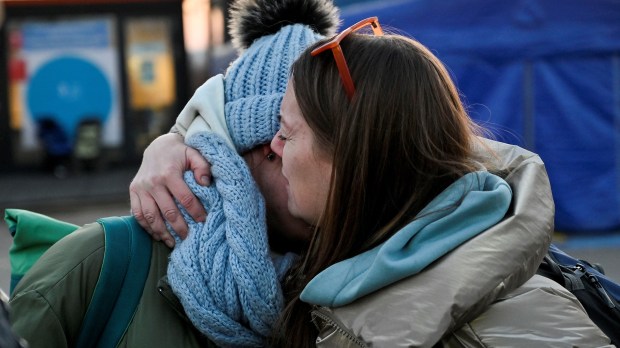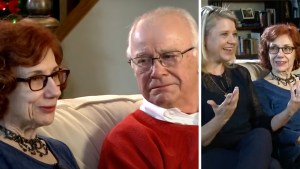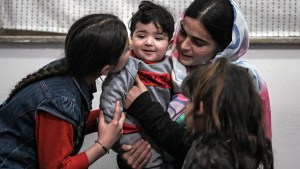Tatyana and Angelika are two Ukrainian sisters who’ve been separated for 20 years. They recently were reunited in Spain due to the ongoing war. War is never something to be “thankful” for, but good can also emerge from tragedy and suffering.
The Guardian reported on this particular story in May. “The moment was both happy and sad,” Angelika Batiai, 24, told reporter Ashifa Kassam. “Here I was seeing my sister again after 20 years, but on the other hand I had just left my family and friends in a country at war.”
Kassam reports that family problems led to the two sisters being separated when they were very young, and financial problems made it impossible to keep the two together. Paradoxically, the calamity of the ongoing war has precipitated events in such a way that they have been reunited.
Separated
The story of these two sisters began a little more than 20 years ago in the village of Nikolaev, in southern Ukraine, in a poor family with an absent mother. The separation created an open wound when the parents decided to entrust their daughters to two different relatives because they no longer had the means or conditions to support them.
Tatyana Kluge García, 25, told the reporter that they begged their parents to keep them together, “But economically it was impossible; Angelika’s aunt couldn’t afford to take us both in.”

Tatyana then went to live with her grandmother, but the situation wasn’t sustainable. She ended up in an orphanage and, fortunately, at the age of 8 she was adopted by a Spanish family in Girona (Spain).
What is needed for survival?
Of course, at the basic level it’s about essential needs. At the most critical time in their lives, Tatyana and Angelika needed a roof over their heads and someone to take care of them, and in their concrete circumstances this was at the cost of their staying together. We can understand this difficult truth, but we can also understand their plea to be united, because bonding isn’t just a sentimental issue. We can see this if we think of many premature twins who, by cuddling together, overcome the critical situation of a difficult and early birth.
The two girls—now young women—still need to be together, although in the meantime they have lived separate and very distant lives. They grew up in different countries — Spain and Ukraine. From a life shared on a day-to-day basis, they went on to speak different languages, an almost insurmountable obstacle to their meeting. Almost …
Finding each other on Facebook
“I always said that I would go to Ukraine and find her,” Tatyana told The Guardian. Like a good teenager, she searched for any trace of her sister on social networks, even using the Russian social network VK, Kassam reports.
Of course, Angelika had the same idea and was also looking for Tatyana. In 2019 she beat her sister to the goal, finding her sister’s Facebook profile. They reconnected and started chatting, planning to meet up, although the pandemic got in the way. This is the best side of social media, when instead of taking us into a simulated reality that distances us from real life it helps us make or restore connections in the real world.
When war broke out, technology was again the key element in helping Angelika escape Ukraine and find hospitality in Spain with Tatyana.
Closing the distance
The two sisters had begun to know each other virtually, but when Ukraine was invaded and the war resulted in massive bombings, the idea of Angelika fleeing to Spain took shape. The actual meeting was like a hasty birth induced by a tremendous conflict.
Tatyana kept in touch through every moment of Angelika’s escape from the war zone. She overcame communication difficulties to buy her sister a plane ticket from Warsaw. Ensuring she would be able to make the flight was complicated and nerve-wracking. “I was going crazy,” Tatyana told The Guardian. “She had never been on a plane, she didn’t know how to check in or check her baggage.”
The physical distance between the two sisters has now disappeared; they have been living together in Girona for a couple of months now. Their 20 years of separation have led to a different kind of distance, including language, which they are still overcoming. Kassam reports that the siblings communicate with a smattering of words they each have learned in the other’s language, along with hand gestures and Google Translate. Still, they tell The Guardian, they are quite comfortable with each other and get along very naturally.
Now they are close to reconquering that strange territory — language — which is a border that persists despite being related. We certainly cannot say that this reunion is “thanks to the war.” But it’s worth noting that just when everything becomes subject to the fear of loss and death, our sight becomes clearer and we become more aware of what we really want to save or recover.



